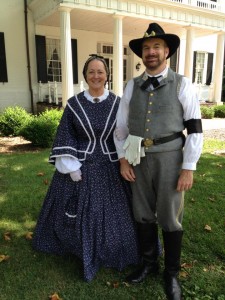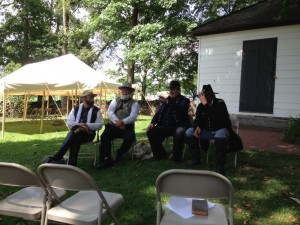Meet the Generals
A few weeks ago, my mother-in-law told me about her friend Doug Batson who (like me) is a Civil War buff. Doug has gone to a little higher level though – he is a living historian who portrays Confederate Major General D.H. Hill. He even got his wife in on it, too. My mother-in-law suggested that it might be fun to go see them at an event.

If you’re not familiar, “living historians” are not the same as “reenactors”. These guys portray a specific historical figure from the Civil War and speak, act, and dress “in-character” as if they are that person. They study their man so that they know as much as can be known about them, and then either give speeches or answer questions as that man. When it’s done well, it’s very engaging.
So last Sunday, we went out to Frederick and got to see Doug do his thing. It began with an outdoor church service complete with period music. In keeping with the sesquicentennial theme of this year, Doug’s part (as Maj. General Hill) was to give a eulogy for his brother-in-law, Thomas Jonathan “Stonewall” Jackson. Doug did a great job with this, even getting emotional toward the end. He and his wife also wore mourning bands on their arms as was the custom.
After the service, there was a “Meet the Generals” session. A few living historians besides Doug were there to talk as the men they were portraying. It was really cool.

From left to right, we had Lt. General Jubal Early, General Robert E. Lee, Maj. General George Thomas, and Maj. General George G. Meade. The format of the event was pretty loose – it was supposed to be a question-and-answer session I think, but no one stepped up to start. My mother-in-law and Doug egged me on.
Being a Gettysburg nerd presented with this array of characters, I had to ask Generals Early and Lee if their relationship was strained after the Gettysburg campaign. You see, as he moved toward Gettysburg on June 25, 1863, Early’s division passed the Caledonia Furnace (owned by rabidly abolitionist Congressman Thaddeus Stevens) and took the opportunity to torch the place. This could be seen as a violation of Lee’s order not to damage civilian property, so I wanted to know if Lee was upset by the action. “General Early” sternly explained that it was a military target, and went off on a tirade about what the Union troops had done to the south. It was a beautiful thing to watch. This guy was good. “General Lee” was (as you might expect) reserved throughout this exchange.
I then turned my attention to “General Meade”, asking him how he felt on June 28th at about 3am. His two-word response, “Heart attack”, was dead-on in my opinion. He had Meade’s look, and seemed to have perfected his attitude as well.
I don’t know as much about General Thomas – I need to learn more about the western theatre of the war – but my initial impression was that this guy was fairly new to the hobby. His portrayal was a little more shy than I’d expect from a guy who became known as “The Rock of Chickamauga”.
After getting some lunch and chatting a little more with “General Lee”, we got to see Doug and his wife perform a piece as General & Mrs. Hill. They had written a dialogue based on letters that the two had written back and forth during the war, and it was pretty good. We all tell our wives about how our day went, and that perspective is an interesting one (though I’m not sure if it is more honest or less so). The “home front” side of the story is pretty compelling, too and Doug’s wife Terri did a fantastic job conveying that.
All in all, it was a wonderful day. If you ever get a chance to see living historians do their thing – especially good ones – you should grab the chance.